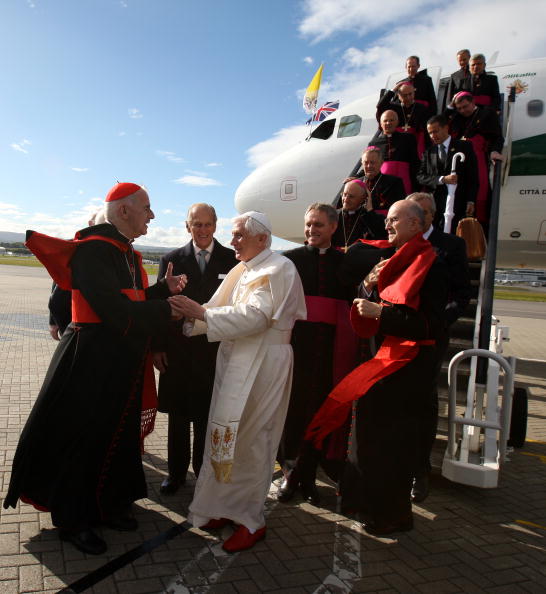Pope Benedict XVI is the best-dressed liar in the world. And in England he presided over the best set-designed lie imaginable. He beatified the nineteenth-century Oxford theologian John Henry Newman, presenting him (in the penultimate step toward canonization) as a docile believer in papal authority, an enemy of dissent, and a rebuke to anyone who questions church authority. When the pope declared authentic the bogus miracle on which he bases the beatification—the claim that a deacon from Boston was cured of a spinal disease after praying to the cardinal—he said in a letter from Rome to England last February “In a social milieu that encourages the expression of a variety of opinions on every question that arises, it is important to recognize dissent for what it is, and not to mistake it for a mature contribution to a balanced and wide-ranging debate.” This is a Newman few who are acquainted with his radical views would recognize.
Newman is a touchy matter in England. He left the Anglican church, thinking it historically disabled as a channel of Christian teaching. To that extent, Benedict is in a good position for claiming Newman’s allegiance to Rome. Admittedly, this is hardly a way to promote ecumenical peace between English and Roman Catholics. For many years Rome would not canonize martyrs like Edmund Campion because they were killed under Queen Elizabeth. Admitting to hostility between London and Rome was considered undiplomatic. But now the pope wants to say that Newman was a standing affront to the church of England—and to say it in England, where he has encouraged Anglican priests to come join the Catholic church. Perhaps, too, he thinks this is a way to reclaim wavering loyalties of the British, and especially the Irish, who have expressed revulsion at the sexual scandals of predatory priests. The pope is breaking his own rule in making the beatification by his own personal act rather than by a brief of the Congregation of Sacred Rites, so he obviously means to be dramatic despite his reputation as an undramatic man.
Whatever his motives, the pope is blatantly defying historical truth when he says that Newman is a model of submission to church authority. Newman was a restive Catholic under constant scrutiny and criticism from Rome until a new pope (Leo XIII) bought him off with a cardinal’s robes when he was eighty and tamable.
He was a fierce critic of Pope Pius IX (beatified in 2000 by Benedict’s predecessor). Pius was pope for over thirty years, and Newman said that any man holding that office even for twenty years was bound to become a tyrant. He was allied with Lord Acton in opposing the “tyrant majority” at the Vatican Council that in the year 1870 declared the pope infallible. He wrote of the Council: “We have come to a climax of tyranny. It is not good for a pope to live twenty years. It is anomaly, and bears no good fruit; he becomes a god, has no one to contradict him, does not know facts, and does cruel things without meaning it.”
Before the Council made the fatal declaration, Newman wrote to his closest friend Ambrose St. John hoping that the Italian forces threatening to take away his secular power would succeed, or that Pius would die: “We must hope, for one is obliged to hope it, that the pope will be driven from Rome and will not continue the council or that there will be another pope. It is sad he should force us to such wishes.” That is far from the figure the current pope will offer the world as a model for submissive belief. Benedict was once a scholar and now claims to be infallible in matters of faith or morals. But on the clearest facts of history he is a dissembler and disguiser. Were Newman alive to hope for preventing this distortion of his history, would he hope for the pope’s demise, as he hoped for Pius IX’s death before he did such damage to the church by claiming “tyrannical” powers?



